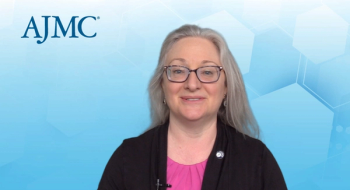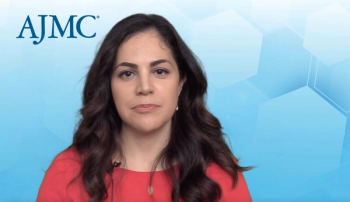
Policy
Latest News

Latest Videos

CME Content
More News

Phaedra Corso, PhD, associate vice president for research, Indiana University, discusses the importance of cost-effectiveness analysis in determining the feasibility and impact of public health interventions.

The Inflation Reduction Act (IRA) has potential to shift incentives for drug manufacturers and impact the amount of long-term evidence generated for approved drugs, said Julie Patterson, PharmD, PhD, senior director of research at the National Pharmaceutical Council.

Nancy Dreyer, PhD, MPH, FISE, chief scientific advisor to Picnic Health, shares some of the ways that direct-to-patient approaches have improved observational research.

On this episode of Managed Care Cast, we're talking with Karen Iapoce, senior director of government products and programs at ZeOmega, about the recent CMS final rule on Medicare Part D and Medicare Advantage.

Fifty percent of US rural hospitals are facing financial problems; US lawmakers have called out the corporate spending of 3 large nursing home companies; hospice patients under Medicare Advantage are now facing uncertainty after the government ended its pilot program.

Kimberly Westrich, MA, of the National Pharmaceutical Council, explains how the 340B program is linked to increased drug spending and the hidden costs associated with it.

Rising Medicare Advantage enrollment occurred alongside declines in enrollment in traditional Medicare with employer-sponsored supplemental coverage and traditional Medicare without supplemental coverage.

The Medicare trust fund is now expected to deplete in 2036, with the Inflation Reduction Act being credited for at least some of the extension.

Seth Berkowitz, MD, MPH, associate professor of medicine, University of North Carolina at Chapel Hill, discussed the challenges associated with developing a whole-person health index and potential solutions for the "wrong pocket" problem.

Inma Hernandez, PharmD, PhD, professor at the University of California, San Diego Skaggs School of Pharmacy and Pharmaceutical Sciences, discussed the potential sources of savings associated with the Medicare Drug Price Negotiation Program.

The Senate Finance Committee has introduced bipartisan legislation that proposes using Medicaid and Medicare programs to help prevent and reduce generic drug shortages; US indicators for COVID-19, flu, and respiratory syncytial virus (RSV) declined further last week; findings from a recent study reveal growing disparities in child death rates across racial and ethnic groups.

CMS rules hindered the access of rural patients with cancer to medically integrated pharmacies in 2023. The authors discuss the impact on equity in health care, emphasizing the need for regulatory change.

A new federal rule will enable thousands of immigrants in the Deferred Action for Childhood Arrivals (DACA) program to obtain health care through the Affordable Care Act; a forthcoming CMS rule is expected to lower home-based care wait times and raise caregiver wages; the HHS Office for Civil Rights has finalized 2 rules that strengthen the ACA’s health care discrimination ban.

About 5000 leaders in health economics and outcomes research will gather for the 2024 meeting, which has the theme, "HEOR: A Transformative Force for Whole Health.”

Two bird flu vaccines could be available within weeks; Walmart Health struggles to expand in retail health care services; repeal of 1864 law preserves abortion access in Arizona.

The Federal Trade Commission (FTC) issued letters to 10 companies to warn them that certain drug patents were improperly listed; the US Department of Agriculture (USDA) will begin testing ground beef for bird flu particles; rural Americans are more likely to die early from 1 of the 5 leading causes of death than those who live in urban areas.

The USPSTF lowered the recommended starting age for mammograms from 50 to 40 years, citing moderate benefits for early detection in this age group. Disparities persist, especially for Black women, highlighting the need for improved access to health care and social support.

Researchers also estimated that more than 700,000 Americans with diabetes could lose insurance coverage if these proposed retractions are put into place, with some new policies already in effect.

Makers of medical tests will have about 4 years to show the FDA that their new offerings deliver accurate results; after previously decreasing for 27 years, US tuberculosis (TB) cases increased every year since 2020; a US district judge rejected a challenge by Bristol Myers Squibb and Johnson & Johnson to the Medicare drug price negotiation program.

Third-party tracking technologies are at the heart of a new analysis, which investigated if hospital websites accurately disclose how they transmit user information to third parties.

Just as it is important for retail analysts to understand the choices their customers make and why they may choose not to purchase a specific item, so is it important for the specialty pharmacy industry to understand the actions of prescribers and how the often inefficient prior authorization process affects patient outcomes.

Payer coverage of biosimilars is always shifting as new ones come to market, explained Tasmina Hydery, PharmD, MBA, BCGP, associate director in digital solutions, Cencora.

A new court ruling has the future use of skinny labels in question, but skinny-label generics have saved Medicare a lot of money over 5 years.

End of reporting mandate signals shift in real-time tracking of airborne pathogens; high rates of psychiatric conditions seen among patients with long COVID; new rule reinforces notification requirements for digital health records and apps.

The 340B hospitals not receiving an offsetting lump-sum payment from CMS following 2018-2022 cuts later ruled unlawful are disproportionately rural, publicly owned, and nonacademic, according to a new study.


















